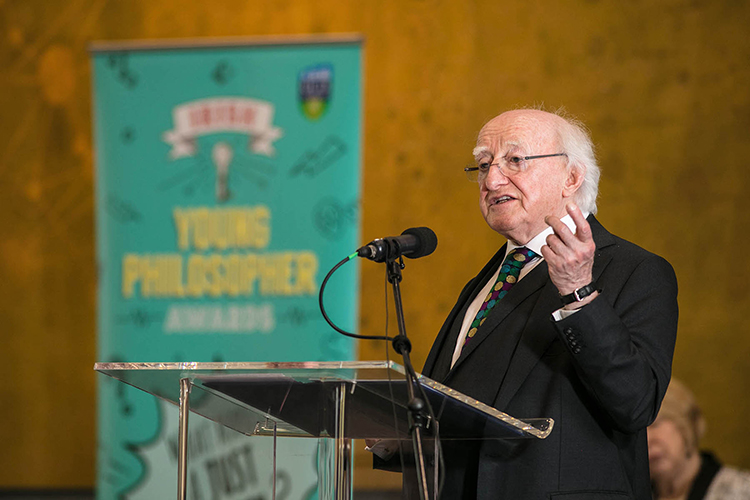Education is more than just learning 'to be useful’ President Higgins tells young philosophers
Posted 16th May, 2019

School students don’t just exist to be “useful” to the knowledge economy said President Michael D Higgins, warning an overemphasis on preparing young people for work has come at the expense of critical thinking in the classroom.
Criticising what he called a “narrow and utilitarian view” in Irish education that suggests “we exist to be made useful” the President said such a viewpoint could lead “to a great loss of the capacity to critically evaluate, question and challenge.”
“Talk of a knowledge society and the demand to enable our young people to meet its needs has at times… come to dominate our view as to the ultimate aim of a secondary school education. We need to be careful.
“There has been a very real danger that the powerful and vital force of creative thinking in the creation of truly functioning societies will come to be forgotten… a lost art as we pursue in a narrow sense, often solely, the skills and outcomes that will prepare young people for the world of paid work.”
Mr Higgins was speaking at (opens in a new window)2019 Irish Young Philosopher Awards at University College Dublin.
A showcase of some of Ireland’s brightest young thinkers, the exhibition, now in its second year, is designed as a philosophical alternative to the BT Young Scientist Awards.
The competition encourages pupils at primary and secondary level to develop their critical thinking skills through classroom discussions and by using mediums such as posters, films, and essays to visualise their philosophical discussions.
Huge congratulations to TY philosophers who swept the board with awards today at the Irish Young Philosophers Awards in UCD. The Grand Prize of Irish Young Philosophers Awards went to Lauren Doyle with her project Why is nature beautiful and why do we destroy it? Excellent work (opens in a new window)pic.twitter.com/UaVpzgv416
— Mount Sackville (@mountsackville) (opens in a new window)May 15, 2019
Over 350 projects were submitted for the this year’s awards, a testimony the President said to the hard work of (opens in a new window)Dr Danielle Petherbridge, of the UCD School of Philosophy, and (opens in a new window)Dr Aine Mahon, of the UCD School of Education, who founded the (opens in a new window)Irish Young Philosopher Awards.
“It is an initiative that will enable future generations and communities, schools of philosophy to emerge enhancing their thinking and reflective processes and exploring and promoting dialogue about life beyond the everyday,” he added.
Our students were thrilled today to meet the inspirational (opens in a new window)@PresidentIRL and his amazing wife Sabina Higgins at the (opens in a new window)#IYPA2019 (opens in a new window)@philosophyire (opens in a new window)@IYPA2018 (opens in a new window)@SchoolofEdUCD (opens in a new window)@ThinkersMidwife thank you to everyone who organized a thoroughly enjoyable and thought provoking day (opens in a new window)pic.twitter.com/IwY5e6yviE
— Griffeen CC (@GriffeenCC) (opens in a new window)May 15, 2019
Top prize at this year’s awards went to Lauren Doyle (16), a transition year student at Mount Sackville Secondary School for her project “Why is nature beautiful and why do we destroy it?”.
Detailing her entry, she made use of the ancient Greek philosophy of the golden mean (or golden middle way) to explain how society has been “unable to find moderation in the modern world.”
“While people generally had affection for the natural world we are becoming ‘less attached’ to it and more heavily dependent on devices that give a distorted view of nature,” she told (opens in a new window)the Irish Times.
“This helps to explain why we destroy what we love.”
Absolutely BLOWN AWAY by the level of philosophical and critical thinking in evidence across all young peoples' projects at the (opens in a new window)#iypa19 awards (opens in a new window)@ucddublin. The buzz of enthusiasm is infectious! You are all winners in my eyes! Huge congrats to all involved! (opens in a new window)pic.twitter.com/zj4tFnGccZ
— Deirdre McGillicuddy (@Deemcgillicuddy) (opens in a new window)May 15, 2019
Addressing the students at the awards, President Higgins encouraged them to ask questions “to which there is, yet, no definitive answer”.
“History tells us that it is the asking of [such] questions that leads to new discoveries, new possibilities… [and] the potential to create a better world no longer scarred by global poverty, growing inequalities, and exclusions and vulnerabilities exploited by hate.”
Mr Higgins said that the nearly doubling of participants at this year’s Irish Young Philosopher Awards was “the best endorsement” that philosophy was “an exciting and an emancipatory practice”.
By: David Kearns, Digital Journalist / Media Officer, UCD University Relations
UCD academics on The Conversation
- Opinion: The leap year is February 29, not December 32 due to a Roman calendar quirk – and fastidious medieval monks
- Opinion: Nigeria’s ban on alcohol sold in small sachets will help tackle underage drinking
- Opinion: Nostalgia in politics - Pan-European study sheds light on how (and why) parties appeal to the past in their election campaigns






